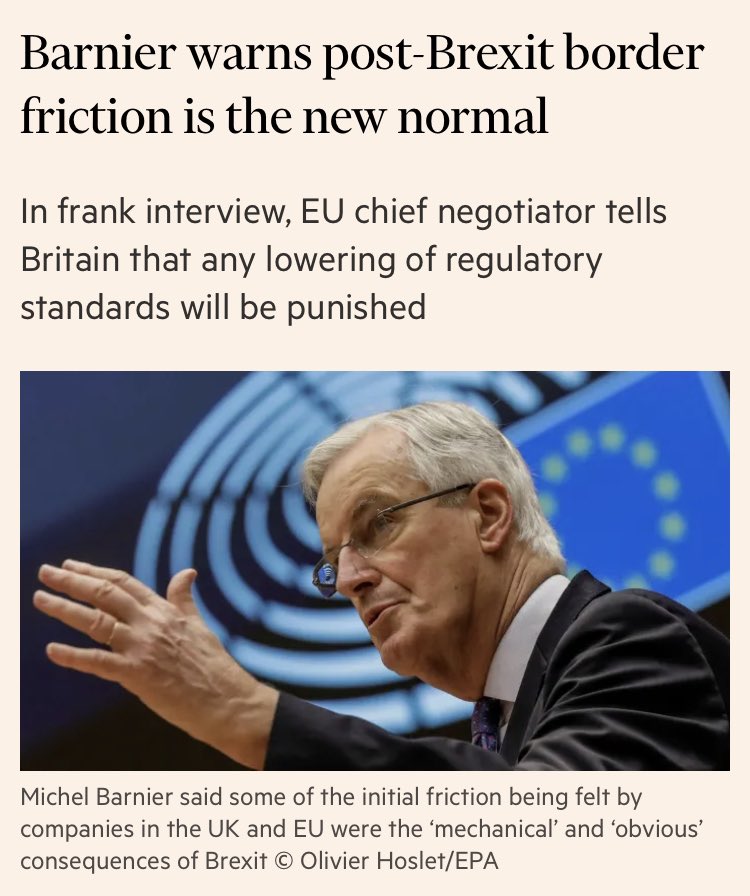Specifically noting current  debate on pesticides, Barnier said that “one ought to be careful . . there will be consequences in terms of going on exporting without tariff w/o quota to our market”. He warned that goods destined for the EU market had to comply with
debate on pesticides, Barnier said that “one ought to be careful . . there will be consequences in terms of going on exporting without tariff w/o quota to our market”. He warned that goods destined for the EU market had to comply with  standards.
standards.
 debate on pesticides, Barnier said that “one ought to be careful . . there will be consequences in terms of going on exporting without tariff w/o quota to our market”. He warned that goods destined for the EU market had to comply with
debate on pesticides, Barnier said that “one ought to be careful . . there will be consequences in terms of going on exporting without tariff w/o quota to our market”. He warned that goods destined for the EU market had to comply with  standards.
standards.
Barnier said|: things have “changed for good” as a result of  policy choices, noting that “there are mechanical, obvious, inevitable, consequences when you leave the single market and that’s what the British wished to do”.
policy choices, noting that “there are mechanical, obvious, inevitable, consequences when you leave the single market and that’s what the British wished to do”.
 policy choices, noting that “there are mechanical, obvious, inevitable, consequences when you leave the single market and that’s what the British wished to do”.
policy choices, noting that “there are mechanical, obvious, inevitable, consequences when you leave the single market and that’s what the British wished to do”.
Barnier underlined  risks losing tariff/quota-free trading rights if it diverges too far below
risks losing tariff/quota-free trading rights if it diverges too far below  regs, singling out
regs, singling out  govt decision to authorise previously banned pesticide.
govt decision to authorise previously banned pesticide.
He said some upheaval were adaptation issues, “glitches, problems, breakdowns” that should clear up.
 risks losing tariff/quota-free trading rights if it diverges too far below
risks losing tariff/quota-free trading rights if it diverges too far below  regs, singling out
regs, singling out  govt decision to authorise previously banned pesticide.
govt decision to authorise previously banned pesticide.He said some upheaval were adaptation issues, “glitches, problems, breakdowns” that should clear up.
But he said both sides need to learn to live with changes resulting from Brexit: from checks on imports of farm produce to ban on travellers bringing meat sandwiches when they cross external border.
“This agreement will not be renegotiated, it now needs to be implemented.”
“This agreement will not be renegotiated, it now needs to be implemented.”
Although it is not necessarily seen in Brussels as a sign of a wider deregulatory shift,  last week granted temporary authorisation for the use of a pesticide suspected of being harmful to bees because of concerns about a disease attacking sugar beets.
last week granted temporary authorisation for the use of a pesticide suspected of being harmful to bees because of concerns about a disease attacking sugar beets.
 last week granted temporary authorisation for the use of a pesticide suspected of being harmful to bees because of concerns about a disease attacking sugar beets.
last week granted temporary authorisation for the use of a pesticide suspected of being harmful to bees because of concerns about a disease attacking sugar beets.
“Pesticides concern public health, the health of farmers, farm workers and consumers,” Mr Barnier said. “Depending on where you set the threshold in that area it can also have an impact on competition and competitiveness.”

 Read on Twitter
Read on Twitter


